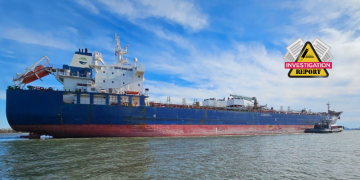The 2025 GREEN4SEA Athens Forum successfully took place on Wednesday 12th of March 2025 at the Lighthouse of Stavros Niarchos Foundation Cultural Center (SNFCC), Athens, where various experts from all parts of the maritime industry gathered to share their insights on green shipping, global developments and the shifting regulatory field around decarbonization.
The event was organized by SAFETY4SEA having as lead sponsors the following organizations: Jotun, MacGregor, and SQE MARINE. The event was also sponsored by: ARCADIA SHIPMANAGEMENT CO. LTD, Blue Planet Shipping Ltd, BUREAU VERITAS, Capital-Executive Ship Management Corp., Capital Gas Ship Management Corp., Capital Shipmanagement, DÖHLE SEAFRONT Crewing (Manila), Dorian LPG, Eastern Mediterranean Maritime Limited (EASTMED), Latsco Marine Management Inc., RISK4SEA, SEAFiT, Sun Enterprises Ltd, UK P&I Club, V. Group, and The World Liquid Gas Association (WLGA).
Supporters of the event included the following organizations: Clean Shipping Alliance 2020, International Bunker Industry Association (IBIA), International Ship Recycling Association (ISRA), International Windship Association (IWSA), INTERCARGO, Zero Emissions Ship Technology Association (ZESTAs) and Women’s International Shipping & Trading Association (WISTA) Hellas.
Agenda highlights
- Addressing uncertainties in the decarbonization journey
- Emerging technologies & innovation
- Industry’s needs to facilitate the transition to low-carbon shipping
- Long-term goals for decarbonizing the shipping industry
- Addressing safety challenges
- Bunkering & latest revision of ISO 8217 standard
- Assessing availability & readiness
- Incentives and regulatory mechanisms for the uptake of alternative fuels
- How collaboration supports industry’s green transition
- Achieving a just and equitable transition towards net zero
- Addressing the human factors: New skills & training methods
- Green shipping initiatives for a sustainable future
Opening the forum, Apo Belokas, Managing Editor, SAFETY4SEA, warmly welcomed attendees and speakers while extending appreciation to the event’s sponsors and supporters. He addressed the maritime industry’s evolving approach to decarbonization, stressing that while progress is being made, there is still a long way to go. He highlighted the need for a balanced strategy that not only prioritizes regulatory compliance but also ensures the safety of the crew and financial feasibility for industry stakeholders.
 Session #1: The path towards maritime decarbonization
Session #1: The path towards maritime decarbonization
Dr. John Kokarakis, Technical Director, SEEBA Zone, Bureau Veritas, delivered an insightful presentation on the challenges and strategies for maritime decarbonization, focusing on FuelEU Maritime compliance and the IMO’s mid-term measures. According to Kokarakis, all these measures loom over the maritime industry like “Damocle’s sword.”
The multi-million-dollar question is what should be done if the computed carbon intensity exceeds the target,
… Kokarakis pointed out, adding that MEPC 83 will be critical as the giants of EU and BRICS will cross their swords and fight for the future of shipping.
Additionally, he presented key compliance strategies, including the adoption of low-carbon fuels. Emphasizing the importance of a holistic approach, he outlined a gap analysis that identifies critical areas for transition,
Capt. Konstantinos G. Karavasilis, Regional Director, Loss Prevention, UK P&I Club, spoke on the critical steps needed for the maritime industry’s decarbonization journey.
The industry faces increasing pressure to decarbonize and, unfortunately, this will reach the end-users, the consumers,
… said Karavasilis, pointing out that apart from environmentally sustainable, the transition should also be economically viable.
Moreover, he emphasized the necessity of clear, long-term policy frameworks and globally aligned regulations to provide stability and direction for industry stakeholders. Highlighting the role of innovation, he underscored the importance of investing in research, development, and expressed his view that nuclear propulsion is the future towards net-zero emissions.
Dimitris Mytilinis, Senior Performance Engineer, Latsco Marine Management Inc. delivered an insightful presentation on the evolving landscape of shipping decarbonization. He also tackled various regulatory frameworks, especially focusing on how measures such as pooling can assist in compliance under the FuelEU Maritime.
Pooling is a better option than paying the penalties
… Mytilinis explained but expressed the opinion that using biofuel is more cost-effective than pooling. He also put emphasis on the importance of strategic planning and the adoption of sustainable technologies to ensure compliance while maintaining operational efficiency.
During the first panel discussion, Stergios Stergiou, Green Shipping & Sustainability Director, Capital Group, also explored various solutions for reducing shipping emissions such as the adoption of LNG and carbon capture.
At Capital we have adopted LNG as a fuel, we consider it as a transitional fuel with several benefits both on machinery and operational aspect
… said Stergiou. Meanwhile, Dr. Anastasios Tsalavoutas, Energy Efficiency Manager, Argo Navis, shared his thoughts on maritime decarbonization saying that “the biggest challenge facing the industry is the uncertainty.” For instance, he expressed his concern about the uncertainties of carbon market measures and the lack of appropriate infrastructure to support the shift towards net zero.
 Focus presentation: Human factors in the decarbonization era
Focus presentation: Human factors in the decarbonization era
Following the discussion, Apo Belokas, Managing Editor, SAFETY4SEA, delivered a focus presentation on the role of human factors in the decarbonization era. He pointed out industry uncertainty, the need to move beyond traditional thinking, and the challenge of upskilling costs. As he explained, “We ask seafarers to have numerous skills but at the end of the day we’re not providing any short of framework on how this will happen.” Additionally, he emphasized that seafarers should be seen as assets rather than expenses.
In our industry no one speaks on the return of investment (ROI) on human capital
… Belokas noted, highlighting that the numbers show that investment on human capital is both feasible and imperative.
Focus presentation: Sea trials practicing in the decarbonization era
Andreas Zontanos, Managing Partner, Argo Navis, followed with another focus presentation on the insights gained from sea trials conducted on existing ships for EEXI (Energy Efficiency Existing Ship Index) calculations. His discussion evaluated the relevance of these trials within the context of the evolving decarbonization landscape in the maritime industry.
We have more and more measures which practically mean taxation, so performance monitoring is getting more and more interesting for shipowners
… Zontanos explained.
Moreover, he explored the applicability, procedures, risks, and benefits of these trials. He emphasized that sea trials, along with continuous performance monitoring, play a crucial role in assessing the impact of energy efficiency retrofits.
Session #2: Fuel for thought: Insights on the alternative options
Bill Stamatopoulos, Global Marine Fuels Business Development Director, VeriFuel, discussed the evolution of the maritime industry, particularly in relation to B100 biofuel. He delved into the introduction of new standards, manufacturer endorsements, and updated standards such as ISO 8217:2024. His presentation covered important insights into biofuels, including their technical specifications, while also addressing their role in ensuring compliance with emerging regulations: “For the next few years we’re only talking about LNG and biofuels,” Stamatopoulos highlighted.
Diane Gilpin, Founder & CEO, Smart Green Shipping Alliance, focused on the journey of wind-assisted propulsion from concept to reality.
We’ve seen wind move ships for thousands of years but how do we introduce it into the 21st century?
… Gilpin said, explaining that the modern adoption of wind-assisted propulsion requires a multi-faceted approach that is based on research. Overall, her presentation emphasized the potential of wind as a renewable energy source to complement otherl propulsion methods, offering an innovative solution to help the industry meet its environmental goals.
Nikos Xydas, Technical Director, World Liquid Gas Association (WLGA), presented on the prospects of using LPG (liquefied petroleum gas) as a marine fuel, focusing on its benefits and growing adoption within the industry.
LPG as it is now, without its renewable alternatives, can be compliant with FuelEU for the next 15 years
… Xydas noted.
He also discussed the potential of renewable LPG and renewable DME (dimethyl ether), emphasizing their synergy as a future-proof solution for maritime decarbonization. Additionally, he pointed out the expected rise in LPG fleet capacity and its appeal to shipowners due to its cost-effectiveness in meeting new low-carbon emission regulations.
Jean-Philippe Arseneau, Special Adviser, ZESTAs, presented on the importance of viable Absolute Zero Emissions solutions such as hydrogen fuel cells and wind power. As he noted: “Hydrogen has not been deployed at a large scale yet and that is the next step that ZESTAs is focusing on.” However, he also acknowledged the progress already made, with numerous hydrogen-powered vessels and onshore infrastructures either operational or under construction, demonstrating that the technology is ready for deployment. Furthermore, he called for greater collaboration within the industry to accelerate adoption.
Antonis Trakakis, Chairman, CIMAC Greece, delivered a presentation focused on solutions to reduce emissions other than relying on non-fossil fuels. He pointed out there are other, more viable options such as carbon capture.
It has come to a point to ask ourselves to not only solve a problem but also which problem to solve
… he said, adding that it makes more sense to use the example of other, heavier polluting industries rather than rely on alternative fuels which come with a significant set of challenges. Furthermore, he explored different types of engines and mechanical solutions and their effectiveness.
 Focus presentation: 2025, 2020-2050, So many uncertainties and now a strong “wildcard”
Focus presentation: 2025, 2020-2050, So many uncertainties and now a strong “wildcard”
John N. Cotzias, Co-Founder, Xclusiv Shipbrokers, delivered a focus presentation on the decarbonization of shipping and the implications it poses financially. He explained that there are certain loopholes that create uncertainties.
Being energy efficient and being leaner and cleaner has to make economic sense
… Cotzias explained.
He advocated that energy efficiency measures are the way to go for maritime decarbonization, as they offer significant carbon emission reduction without major costs or the need for excessive training. Furthermore, Cotzias delved into the implications of TrumpEconomics and how the US President’s tariffs will change the landscape.
 Session #3: Stepping towards the green transition: Ship Managers’ perspective
Session #3: Stepping towards the green transition: Ship Managers’ perspective
During the last panel discussion Takis Koutris, Managing Director, Roxana Shipping S.A.; Panos A. Kourkountis Technical Director, Sea Traders S.A; Costas Th. Kontes, Chief Commercial Officer, Navilands Management Holdings S.A; George Souravlas, Founder & CEO, Load Line Marine S.A; and John N. Cotzias, Co-Founder, Xclusiv Shipbrokers Inc, discussed the challenges and opportunities ship managers face in implementing green technologies, managing fuel transitions, and meeting regulatory uncertainties.
The speakers also discussed Trumponomics, and how the US President’s plans to boost national ship building impact the industry.
The biggest problem with reviving US shipbuilding is labor cost because it’s a labor-intensive process
… John N. Cotzias Kotzias said on the matter, with George Souravas adding that “You cannot become a ship-building nation overtime, it’s a culture” and that it takes time to build the labor force. Furthermore, Souvaras made the point that if shipbuilding is disrupted it will also stall greener ships being built and 2050 targets being met.
The panel also discussed green fuels on the path to transition. According to Takis Koutris, alternative fuels pose many questions as “There is not fuel availability quantity wise or network-wise.” “We are regulating with wishful thinking”
Stakeholders are starting to experiment with alternative fuels without considering the dangers such as having unskilled people operating these ships
… Costas Th. Kontes noted.
Beyond the challenges of green fuel adoption, panelists also examined the broader economic impact of shifting policies. Addressing the rise of protectionism in the US and Europe, Panos A. Kourkountis remarked, “At the end, consumers will buy fewer products. The market will suffer with taxations, and I expect that transportation will be reduced.”
EXPLORE MORE ABOUT THE 2025 GREEN4SEA FORUM HERE





























































